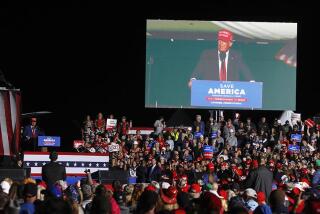Polls Don’t Necessarily Reflect ‘Public Opinion’
- Share via
Those who take polls say they capture public opinion at a given moment in time. But there is reason to doubt whether what they give us is reality at all.
In fact, Americans hold inconsistent and often contradictory positions on public policy questions. Today, fewer than half of Americans can even name their representatives in Congress, with barely one in 10 able to say what policies and programs that person backs.
Despite public ignorance, disconnect and disenchantment about government, pollsters and journalists love to trumpet the results of polls as definitive measures of public attitudes. It’s instant news. The stories practically write themselves. But how can anyone call evolving, ever-shifting congeries of individual belief “public opinion”? The truth is that polls aren’t an objective measure of public attitudes. They form opinion as much as they measure it.
Within the academic community, polling results are not seen as the hard-and-fast measure of public opinion portrayed by newspapers and pundits. Results are rough and inconsistent because many Americans make up their minds depending on how questions are worded or how events are presented or “framed” by the media and pollsters.
In “The Nature and Origin of Mass Opinion,” UCLA political science professor John R. Zaller writes, “The public, having no fixed true opinion, implicitly relies on the particular question it has been asked to determine what exactly the issue is and what considerations are relevant to setting it.”
Thus the public’s voice, so important to our democratic institutions, is being distorted by the unreflective “self-delusion” that a poll is the last word in public debate.
Abraham Lincoln said that in a free society, “the first task of statesmanship is not legislation but the molding of that opinion from which all legislation flows.” Today, Lincoln’s formulation has been twisted. Lawmakers largely have abandoned the job of molding public opinion. The media have filled the void, leaving lawmakers to bow and scrape before the all-powerful poll.
When the House managers launched their impeachment case against President Clinton a year ago, they admitted they were swimming against the tide of public opinion. Their Senate colleagues, however, were guided by polls and rejected the case against the president with little deliberation. As the White House told it and the press dutifully reported, Clinton was the big winner.
But a new Gallup poll for USA Today and CNN finds that half of Americans now say they approve of Clinton’s impeachment. That’s quite a switch. Another 42% think the Senate should have removed him from office.
Just one year ago, the same USA Today-CNN-Gallup poll showed that only 35% of Americans supported Clinton’s impeachment. Back then, almost two out of three persons surveyed disapproved of the House impeachment vote. Today, fewer than half do.
These new Gallup results sound a warning against interpreting poll results too broadly. Throughout 1998, the media focused single-mindedly on the president’s job approval ratings. The result was a day-to-day reinforcement of Clinton’s high numbers. In fact, they may have been measures of how well the smear job on the independent counsel and the president’s critics was working.
As the rise in support for Clinton’s impeachment and removal show, Americans often hold inconsistent positions that rarely are noted in polling reportage. People were asked to make hasty judgments without taking time to think about the facts. Yet at the height of the scandal, many Americans expressed serious misgivings about Clinton and said they were ashamed of him and that he should consider resigning. Yet to actually remove Clinton would have felt too drastic.
While the press trumpeted “censure” and pointed to widespread public support for such a congressional rebuke, the public didn’t know what it was supporting. The Polling Co., based in Washington, found that 24% of likely voters didn’t even know what censure meant, never mind that it was an unconstitutional chimera.
Gallup’s results represent a change in public perceptions about the Clinton-Lewinsky scandal. For now. But the real story is how the media and pollsters affect our democratic institutions. Their impact deserves more careful discussion--and warning labels on poll results that are used for broad-based conclusions about “what Americans really think.”
More to Read
Get the L.A. Times Politics newsletter
Deeply reported insights into legislation, politics and policy from Sacramento, Washington and beyond. In your inbox twice per week.
You may occasionally receive promotional content from the Los Angeles Times.










